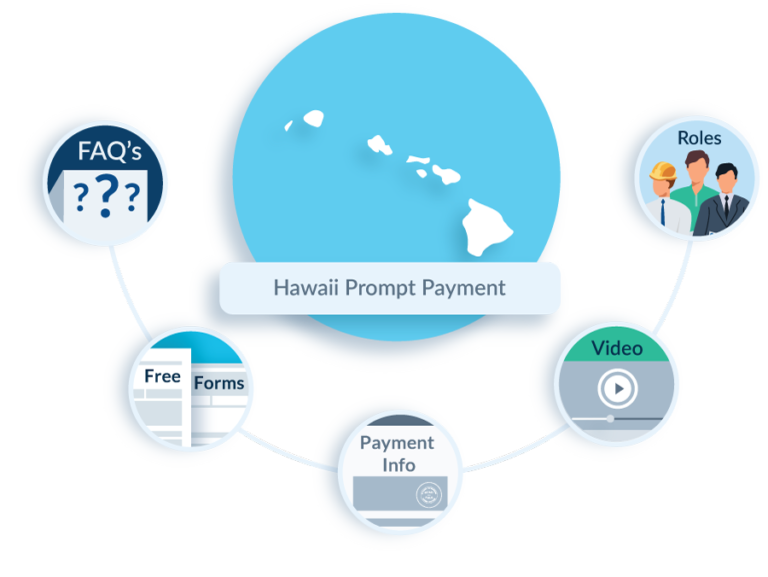Hawaii Prompt Payment Requirements
- Private Jobs
- Public Jobs
- Top Links
Prime Contractors
For Prime (General) Contractors, no provision for payment from owner to prime.
Subcontractors
For Subcontractors, payment must be made within 10 days of request for payment. But may be withheld until funds received from escrow or trust if lower-tiered party was made aware of such limitation in bid process.
Suppliers
For Suppliers, payment must be made within 10 days of request for payment. But may be withheld until funds received from escrow or trust if lower-tiered party was made aware of such limitation in bid process.
Interest & Fees
Interest at 1.5% month, no fees provision.
Prime Contractors
For Prime (General) Contractors, payment due within 30 days of request for payment.
Subcontractors
For Subcontractors, payment due within 10 days after payment is received above.
Suppliers
For Suppliers, payment due within 10 days after payment is received above.
Interest & Fees
Interest at 1.5% per month for subs; 2% per month for Prime (but only after payment 30 days late).
Prompt payment laws are a set of rules that regulate the acceptable amount of time in which payments must be made to contractors and subs. This is to ensure that everyone on a construction project is paid in a timely fashion. These statutes provide a framework for the timing of payments to ensure cash flow and working capital.
Projects Covered by Prompt Payment in Hawaii
The state of Hawaii regulates prompt payment on both private and public construction projects.
Private Projects
Private construction projects in Hawaii are governed by Haw. Rev. Stat. §§444-1 & 444-25.
Payment Deadlines for Private Projects
In Hawaii, there are no provisions covering payment from the property owner to the prime contractor. As for payments from contractors to subcontractors and suppliers, these payments must be made within 10 days of receipt of payment request. If, however, the project is funded by money held in escrow or a trust fund, payment can be withheld past the 10 day deadline until the funds are received. This is only possible if the lower-tiered party was made aware of this during the bidding process.
Penalties for Late Payment on Private Projects
Payments may be delayed if there is a bona fide dispute over the goods or services contracted for. If there is no bona fide dispute, any payments that are late or wrongfully withheld, will begin to accrue interest at a rate of 1.5% per month until the balance is paid.
Public Projects
In Hawaii, all public construction projects are regulated by Haw. Rev. Stat. §§103-10 to 103-10.5.
Payment Deadlines for Public Projects
When a prime contractor has performed in accordance with the contract terms, they can submit a payment request to the public entity. The public entity must make payment within 30 days of either receipt of the pay request or delivery of goods or services, whichever is later. Upon receipt of a proper request, the public entity must make payment within 30 calendar days. Once the prime contractor has received any type of payment from the public entity, the contractor must pay their subcontractors within 10 days of receipt of payment.
Penalties for Late Payment on Public Projects
Payments may be withheld if there is a bona fide dispute concerning the labor or materials, labor disputes, power or mechanical failures, and any other event that is beyond the control of the public entity. If none of these reasons exist, and payments are late or wrongfully withheld, interest will begin accruing after the payment became due. For late payments to prime contractors, interest will accrue at a rate equal to the prime rate plus 2%. The prime rate will be the rate posted by the Wall Street Journal on the first business day of the calendar month. As for late payments to subcontractors, the interest rate will be 1.5% per month.

